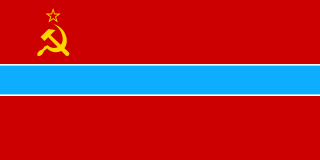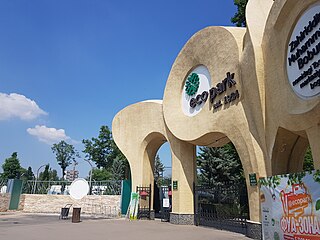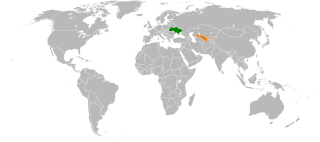Related Research Articles

Uzbekistan, officially the Republic of Uzbekistan, is a country located in Central Asia. It is surrounded by five countries: Kazakhstan to the north, Kyrgyzstan to the northeast, Tajikistan to the southeast, Afghanistan to the south, and Turkmenistan to the southwest, making it one of only two doubly landlocked countries on Earth, along with Liechtenstein. Uzbekistan is part of the Turkic world, as well as a member of the Organization of Turkic States. Uzbek is the majority language, while Russian is widely spoken and understood. Islam is the predominant religion, and most Uzbeks are Sunni Muslims.

Uzbekistan is a landlocked country in Central Asia. It is itself surrounded by five landlocked countries: Kazakhstan to the north; Kyrgyzstan to the northeast; Tajikistan to the southeast; Afghanistan to the south, Turkmenistan to the south-west. Its capital and largest city is Tashkent. Uzbekistan is part of the Turkic languages world, as well as a member of the Organization of Turkic States. While the Uzbek language is the majority spoken language in Uzbekistan, Russian is widely used as an inter-ethnic tongue and in government. Islam is the majority religion in Uzbekistan, most Uzbeks being non-denominational Muslims. In ancient times it largely overlapped with the region known as Sogdia, and also with Bactria.
As of 2007, Uzbekistan's overland transportation infrastructure declined significantly in the post-Soviet era due to low investment and poor maintenance. Air transport was the only branch that received substantial government investment in the early 2000s, as airport modernization projects were undertaken. In the following years, improvements have been made to the surface transport network including the construction of the Tashkent–Samarkand high-speed rail line.
The Uzbeks are a Turkic ethnic group native to the wider Central Asian region, being among the largest Turkic ethnic group in the area. They comprise the majority population of Uzbekistan, next to Kazakh and Karakalpak minorities, and are also minority groups in Afghanistan, Tajikistan, Kyrgyzstan, Kazakhstan, Turkmenistan, Russia, and China. Uzbek diaspora communities also exist in Turkey, Saudi Arabia, United States, Ukraine, and other countries.

Samarkand or Samarqand is a city in southeastern Uzbekistan and among the oldest continuously inhabited cities in Central Asia. Samarqand is the capital of Samarqand Region and a district-level city, that includes the urban-type settlements Kimyogarlar, Farhod and Khishrav. With 551,700 inhabitants (2021), it is the third-largest city of Uzbekistan.

Tashkent or Toshkent ; historically known as Chach, Shash, Binkat) is the capital and largest city of Uzbekistan. It is the most populous city in Central Asia, with a population of 3 million. It is located in northeastern Uzbekistan, near the border with Kazakhstan.

The Uzbek Soviet Socialist Republic, also known as Soviet Uzbekistan, the Uzbek SSR, UzSSR, or simply Uzbekistan and rarely Uzbekia, was a union republic of the Soviet Union. It was governed by the Uzbek branch of the Soviet Communist Party, the legal political party, from 1925 until 1990. From 1990 to 1991, it was a sovereign part of the Soviet Union with its own legislation.

The Khanate of Kokand was a Central Asian polity in the Fergana Valley centred on the city of Kokand between 1709 and 1876. Its territory is today divided between Uzbekistan, Kyrgyzstan, Tajikistan, and Kazakhstan.

Tourist activities in Uzbekistan range from outdoor activities, such as rock-climbing, to exploration of its archeological and religious history. The Statistical Internet Survey conducted between May 7 and August 27, 2008, found that the majority of those surveyed (39%) visit Uzbekistan due interest in its architectural and historical sites. The next-largest group (24%) visited Uzbekistan to observe its culture, way of life, and customs.

Soviet Central Asia was the part of Central Asia administered by the Soviet Union between 1918 and 1991, when the Central Asian republics declared independence. It is nearly synonymous with Russian Turkestan in the Russian Empire. Soviet Central Asia went through many territorial divisions before the current borders were created in the 1920s and 1930s.
Ari Babakhanov is an Uzbekistani musician who performs the long-necked lutes tanbur, qashqari rubab and dutar.

Suzani is a type of embroidered and decorative tribal textile made in Tajikistan, Uzbekistan, Kazakhstan and other Central Asian countries. Suzani is from the Persian سوزن Suzan which means needle. The art of making such textiles in Iran is called سوزندوزیSuzandozi (needlework). Suzanis are rather delicate and extremely few examples survive from before the late 18th and early 19th centuries. They belong, however, to a very ancient tradition. In the early 15th century, Ruy Gonzáles de Clavijo, the Castilian ambassador to the court of Timur (Tamerlane), left detailed descriptions of embroideries that were probably forerunners of the suzani.
Ilkhom Theatre is a theatre company based in Tashkent, Uzbekistan. Founded by Mark Weil in 1976, it was the first independent theatre in the Soviet Union, and remains self-supporting to this day.
Ilhom Moʻminjonov, also spelt Ilkhom Muminjonov is a former Uzbek footballer.

The Syr-Darya Oblast was one of the oblasts of the Russian Empire, a part of Russian Turkestan. Its center was Tashkent.

The Tashkent–Bukhara high-speed rail line is a 600-kilometre (373 mi) high-speed rail connection between Tashkent and Bukhara, two major cities in Uzbekistan. The route passes through six regions: Tashkent, Sirdaryo, Jizzakh, Samarqand, Navoiy, and Bukhara in Uzbekistan. Trains operate seven days a week under the brand name Afrosiyob. The line originally ran from Tashkent to Samarqand, but an extension to Bukhara went into operation on 25 August 2016. Travel from Tashkent to Bukhara, a distance of 600 km (373 mi), now takes 3 hours and 20 minutes instead of 7 hours.

Yashnobod is one of the twelve districts (tuman) of Tashkent, the capital of Uzbekistan.

The Navoi Theater is the national opera theater in Tashkent, Uzbekistan.

Aleksandr Vasilievich Nikolayev, also known as Usto Mumin, was a Soviet painter of Russian origin, who lived and worked in the Uzbek SSR.

Diplomatic relations between Ukraine and Uzbekistan were established on 25 August 1992.
References
- The World Encyclopedia of Contemporary Theatre: Asia by Don Rubin